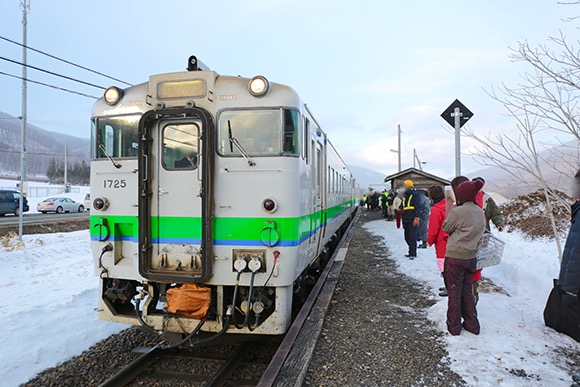The train station that stayed open for a single school girl finally closes down

Last year Kyu-shirataki Station made headlines around the world for staying open just to send one girl to school, but now that she’s graduating, it’s time to pack it in.
News of delaying closures along the “Shiraktaki Series” of stations to accommodate a single student began to make headlines in Japan last year and by the New Year’s holidays had snowballed into international news.
These stops, Kami-shirataki, Kyu-shirataki, and Shimo-shirataki, were ordinarily on the periphery of Japanese railfans’ radar. At least, that was until the story broke and enthusiasts armed with cameras flooded in to capture a piece of history.
However, that madness eventually died down and on 25 March, with Kyu-shirataki’s sole passenger graduating, it was time to call it quits. So, our Hokkaido-based writer K. Nagahashi headed to the station for one last look.
Nagahashi first visited the famous Kyu-shirataki Station to see the last train to ever stop there. Many other people had come out as well, but it was far from the circus of camera-hounds that had befallen the platform months before.
There was a solemn but warm atmosphere with a handful of members of the press and local residents hanging around. The station set up a tent offering free milk and sweet potatoes to those in attendance.
Before the train arrived, Nagahashi took a look at the station, which really was just a worn down wooden shed with a single, bare incandescent light bulb and a paper banner that read, “Kyu-shirataki Station, 69 Years, Thank You.”
A bouquet of flowers sat on the scuffed up bench and a timetable hanging on the wall showed the four times a day that a train had stopped at Kyu-shirataki Station.
A short while later the 4:53 train bound for Ashikawa arrived on time. Although the train had quite a few people on it, it seemed that even more had gathered from the surrounding area to pay their respects for the last time this would ever happen.
It was a dignified procession and the warmth and respect that the local people held for this station was clear. Beyond the girl in the headlines, this station had meant something to everyone there and starting today those memories would be all that was left of it.
With that chapter closed, Nagahashi also wanted to stop by the other two stations that were closing. Although, not nearly as famous, they each had their own special qualities.
When the news of the school girl broke, many media outlets mistook Kyu-shirataki Station for Kami-shirataki Station. It was understandable because this station had the dubious honor of only having two trains stop there each day.
Although, Nagahashi couldn’t confirm it, this was probably a national record for the least number of trains arriving at a station. And if that record didn’t stick, Kami-shirataki Station certainly would have been a contender for the longest train ride until the next station, clocking in at one hour and eight minutes.
Despite this, it had a much more spacious building and a banner that read, “Kami-shirataki Station, 84 Years, Job Well Done!” A similar banner also hung on the outside next to the station’s handmade sign.
Shimo-shirataki Station had a similar decor but boasted 87 years of operation and a couple more trains passing through.
It had the distinction of being among the most remote train stations in Japan. Beyond the neighboring cattle ranch and handful of buildings nearby, Nagahashi had trouble distinguishing any other man-made structures as far as he could see.
Finally Nagahashi paid a visit to Shirataki Station, the only surviving stop of the Shirataki Series, and he could see why it was sticking around! The station was downright palatial compared to the others.
Complete with chairs, aluminum siding, a clock, official JR signage, and 11 trains a day, it was superior to the others in every way. Clearly this was to be the future of Shirataki’s rail transportation needs.
Everywhere in Japan, spring brings changes such as this. Students graduate and move on to new experiences, weary businesses close their doors for good, while young ventures full of hope open theirs for the first time. Everyone’s moving somewhere but during all this there will always be stops along the way of the memories of the people and places we have touched and that have touched us.
Original article by K. Nagahashi
Source – roketnews
